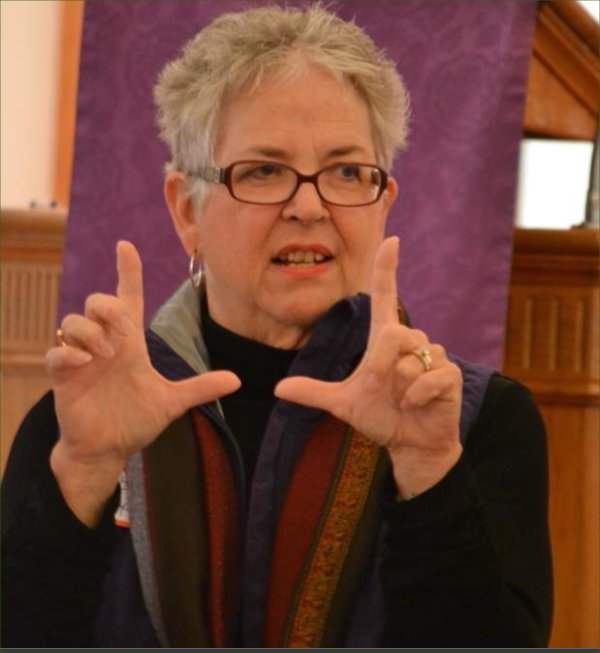Boldly Committed to Truth Telling in the False Face of Fakery
Please AI, write me an essay

Lib Campbell: Above
There is nothing wrong with using somebody else's words, as long as we cite the source. Give credit where credit is due. James Patterson and several other authors are raising the alarm about their work being used in AI writing. A clergy friend told me that if you ask ChatGPT, a multi-million-dollar artificial intelligence company, to write a prayer for someone who is seriously ill, or who is facing financial troubles, or whatever parameters you might need, a prayer will pop out ready to roll. Worship work. Check.
In my research of AI, especially ChatGPT, I found Wikipedia expressing the same anxiety many of us have: "Some observers express concern over the potential of ChatGPT to displace or atrophy human intelligence, and its potential to enable plagiarism or fuel misinformation."
Plagiarism and misinformation are things we may not like, but we do understand. People seek short cuts. They want to impress without having to do the work. False information shapes the conversation to what I want it to be. Many a college student has turned in work and a professor finds uncited source material they recognize as having been written by someone else. Sometimes, students turn in whole essays written by other people. We seem to be a lazy bunch.
The Wikipedia piece that alarms me is the "potential of ChatGPT to displace or atrophy human intelligence." This should be a wake-up call to all of us.
I see another danger as AI becomes more available, particularly as it relates to sermons and prayers. I can see that faith will wither as the equation of the heart is removed from the process. Or if legal briefs are generated by AI, how will passion by a prosecutor or defense attorney shape the argument when the voice is automated?
r. Darren Keats in California sounds an alarm in the education sphere. His concern is not only about widespread plagiarism, but about the loss of critical thinking skills to a point of the withered brain that ensures, "the inability to do anything that requires processes of thought, and interaction with people that builds a world."
There is a point at which technology, developed to make life easier, can make it more complicated. AI is an example. Artificial intelligence is a double-edged sword. Designed to supplement our life in ways of navigation, housework, playing music off a list and helping us find the car keys. People using Chatbot data as their own work makes AI seem nefarious. But AI does not have a moral compass to discern what is good and what is bad, or even sketchy. Ask a question; get an answer. No moral dilemma from the machine's point of view.
The Creator is one of the big movies being released this summer. The trailer is so disturbing the movie will not be on my list to see. A post-apocalyptic dystopian scene is the backdrop for a war between AI robots and humans. Existence in the world is at stake. (If this were an impossibility, it might not be so scary.) At the center of the story is a small child who holds all the secrets of life and death. The robots and the humans are at war over the child. When the child takes his hat off, just behind his ear is a computer controlling his young brain. When the child is asked who he hopes will win the war, he replies, "The robots."
Much is being written now about Chatbots, Open AI and all the emerging iterations of artificial intelligence. Staying informed will help us make better decisions on how it will impact our lives. Hal is alive and well among us. It is up to us to see how much power he will be given.
One bit of news that might slow the AI train is the dwindling of computer chips available to manufacture artificial intelligence. The economics of supply and demand might just put the brakes on.
Lib Campbell is a retired Methodist pastor, retreat leader and hosts the website: avirtualchurch.com. She welcomes comments at libcam05@gmail.com.
| Legislators go home! | LibSpeak, Editorials, Op-Ed & Politics | Hospitals Sued 7,517 Patients, Family Members Over Medical Debt |
Latest Op-Ed & Politics
|
Mark 8:15 And he charged them, saying, Take heed, beware of the leaven of the Pharisees, and of the leaven of Herod.
Published: Saturday, April 27th, 2024 @ 9:20 am
By: Countrygirl1411
|
|
So God created man in his own image, in the image of God created he him; male and female created he them.
Published: Saturday, April 27th, 2024 @ 9:12 am
By: Countrygirl1411
|
|
Majority also believe that prosecution by Bragg is a political witch hunt
Published: Saturday, April 27th, 2024 @ 8:47 am
By: John Steed
|
|
leftwing ideology can kill
Published: Friday, April 26th, 2024 @ 8:37 pm
By: John Steed
|
|
Governor expected to sign into law
Published: Friday, April 26th, 2024 @ 1:48 pm
By: John Steed
|
|
Atheist Soros, although born Jewish, was Nazi collaborator in Hungary in WWII
Published: Friday, April 26th, 2024 @ 11:58 am
By: John Steed
|
|
anti-immigration conservative nationalist beats Social Democrat incumbent 2 to 1
Published: Friday, April 26th, 2024 @ 9:19 am
By: John Steed
|
|
protecting children and parents from gender ideology promoters
Published: Friday, April 26th, 2024 @ 6:45 am
By: John Steed
|
|
Biden wants to push this in public schools and Gov. deSantis says NO
Published: Thursday, April 25th, 2024 @ 9:19 pm
By: John Steed
|

























